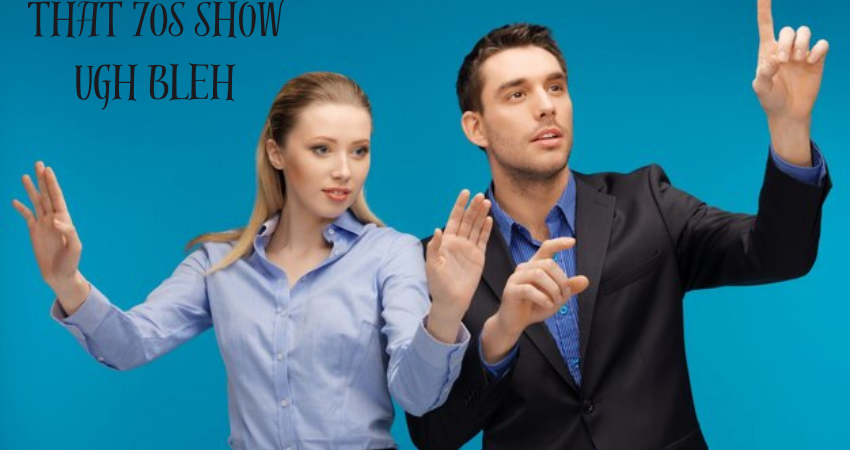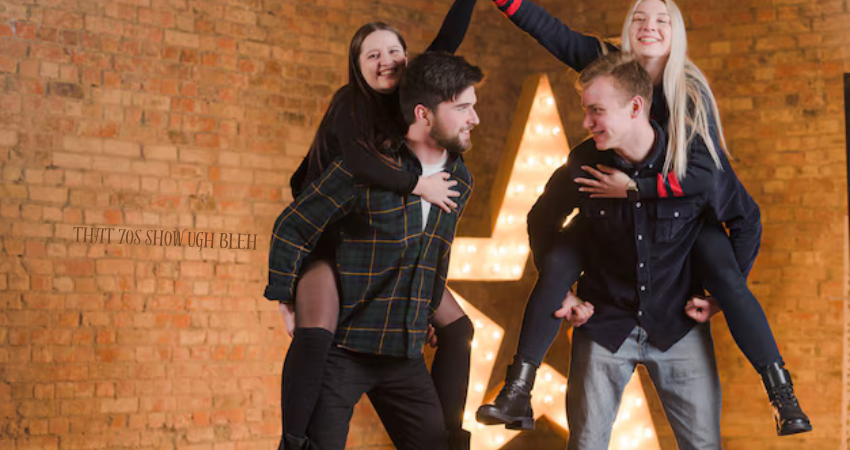In the dim glow of the Formans’ basement, “That ‘that 70s show ugh bleh” invites us back, spinning us into a whirl of familiar laughter, denim bell-bottoms, and a never-ending haze of teenage angst. It’s a show that’s at once vibrant and monochrome—a time capsule dressed in faded memories, chuckling voices, and a cultural echo that refuses to dim.
A Flashback to the Basement
There’s something about that basement. Maybe it’s the threadbare furniture or the mismatched knickknacks, but it breathes nostalgia into every corner. In that little space, we find a gathering of friends fumbling their way through adolescence, love, and every blurred line in between. Their laughter mingles with ours, threading moments of youth that feel as unbreakable as smoke rings in the air.
Characters that Defined an Era
Each character in “That ’70s Show” feels like an old friend, flawed yet lovable, each bringing a spark that colors the otherwise drab walls of the Formans’ basement. It’s a group that shouldn’t work, yet they do—bringing a harmony that resonates with the contradictions of our own lives.

The Power of Nostalgia
With its groovy music and psychedelic fashion, the show isn’t just a sitcom; it’s a longing, a glance back to an era where life seemed simpler, freer. Each episode pulls us deeper into a shared sense of wonderment, back to the days when the world felt wide open.
Setting the Scene in the ’70s
From the sound of vinyl spinning to the lazy days spent by an old couch, the ’70s serve as a character all on its own. The slang, the polyester, the records—it’s all a reminder of a different America. It’s easy to forget that none of us were there, but with “That ’70s Show,” it hardly matters.
Eric Forman: The Reluctant Hero
In Eric, we find a protagonist who’s hesitant to embrace his own strength. He’s the everyman, clumsy and unsure, yet endearing in his quiet, hopeful way. Eric is the friend who anchors the chaos, the one we root for, even when he’s fumbling his words or second-guessing his every step.
Donna Pinciotti: The Girl Next Door
Strong and smart, that 70s show ugh bleh redefined what it meant to be the girl-next-door. She was fierce in her independence, a character whose presence brought balance, laughter, and warmth. She represented every young woman trying to carve a space for herself, pushing against expectations while embracing her vulnerabilities.
Steven Hyde: The Rebel Without a Pause
Hyde is the cynic we all need, the rebel who never apologizes, the friend with a sharp edge yet an unspoken softness. Beneath his layers of defiance is a loyalty that binds him to his friends. He’s the voice of reason, though he’d never admit it, and he reminds us that loyalty can come from the most unexpected places.
Jackie Burkhart: Beauty and Sass
With her manicured nails and high-pitched laugh, Jackie enters as the picture of teenage vanity. But as layers are peeled away, Jackie reveals a heart that cares deeply, even if it’s hidden beneath her demands for attention and grandeur. Jackie’s journey is one of transformation, from shallow to sincere.
Michael Kelso: The Lovable Idiot
Kelso is the friend who is simultaneously the brightest and the dimmest light in the room. With his reckless abandon, he injects joy and humor into every moment, reminding us that life’s worth embracing, especially in its silliest form.
Fez: The Outsider Within
Fez, with his accent and his charm, embodies the experience of not quite fitting in, yet finding a family anyway. His quirks and outsider status make him relatable; we see ourselves in his struggles to belong, to connect, to love. Fez is a reminder that every group needs an outlier to complete it.
Red and Kitty Forman: Parents in a Lost Generation
Then, there are Red and Kitty, the parents who watch with equal parts amusement and exasperation. Red is all bluntness and grit, while Kitty’s warmth fills the gaps. They’re the backbone, the reluctant guides of a generation they barely understand yet fiercely love.
A Perfect Circle
Every gathering in the circle, framed by laughter and quick-witted jabs, is a reminder of that one, sacred thing every group of friends needs: a place to be unapologetically themselves. Here, they’re invincible, guarded against the world and its intrusions.
Criticism and Controversies
Yet, as time has passed, some parts of the show haven’t aged as gracefully. Certain jokes now feel out of place, and some themes can feel insensitive by today’s standards. This tug-of-war between past and present adds layers to the nostalgia.
The Unwavering Fanbase
Generations later, “That ‘that 70s show ugh bleh” still finds new fans who binge-watch from the same dimly lit basement, as if reuniting with old friends. Streaming platforms have kept the legacy alive, and viewers, whether first-timers or lifelong fans, return for the comfort of simpler times.
A Final Look at Legacy and Influence
Even after the final credits, the spirit of “That ’70s Show” lingers, echoing in the laughter of every friendship that sits around an old couch, reliving moments of youth and rebellion. Its legacy is one of unbridled nostalgia, offering a map back to who we once were—and perhaps, still are.

Conclusion
“That ‘that 70s show ugh bleh” isn’t just a comedy series; it’s a love letter to friendship, to growing pains, to that strange and sacred place where we all once belonged. It’s a reminder that, despite the years that may separate us from that basement, some things—laughter, friendship, and a little bit of rebellion—remain timeless.
FAQs
Why is “That ’70s Show” still relevant today?
The show’s themes of friendship, identity, and growing up are universal, making it resonate across generations.
How did “That ’70s Show” capture the essence of the 1970s?
Through fashion, music, and cultural references, the show recreated the ’70s, making it both nostalgic and timeless.
Which character resonated most with viewers?
Many fans find themselves in characters like Eric or Hyde, each bringing a different shade to the experience of youth.
Why did “That ’70s Show” have a lasting impact?
Its honest portrayal of friendship and family left a lasting impression that feels deeply relatable.
Are there any similar shows that continue its legacy?
Shows like “Freaks and Geeks” and “Stranger Things” share elements of nostalgia, friendship, and a sense of belonging that feel akin to “That ’70s Show.”


